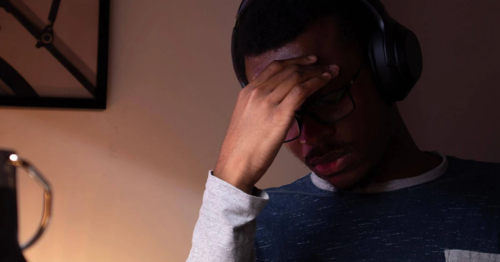
Table of Contents
Here’s How To Get Out of Survival Mode

Written By: Sarah Fielding

Clinically Reviewed By: Dr. Don Gasparini
January 11, 2024
5 min.
Therapist-approved tips for getting out of survival mode, including changing your sleep habits, asking for help, and attending therapy.
Learn more about our Clinical Review Process
Table of Contents
There’s something especially unnerving about being in survival mode. It can feel like using all your energy to stay afloat or as though nothing is fully in your grasp. “You’re just going through the day-to-day with no real energy, no real motivation,” explains Anne Oeswein, M.Ed., LPC-S, Charlie Health Clinical Supervisor Southern Region.
Although survival mode itself isn’t a mental health condition, it can cause or stem from ones like anxiety and depression. Survival brain, like these conditions, can make you feel like you’re “numb” or “just going through the motions,” according to Oeswein. Since it’s not a diagnosable condition, it’s up to you to figure out if you’re in survival mode, ideally with the help of a mental health professional. Once you’ve determined you are in this state, though, there are things you can do to cope and get out of survival mode. Read on for these tips.
Join the Charlie Health Library
Get mental health updates, research, insights, and resources directly to your inbox.
You can unsubscribe anytime.
3 tips for how to get out of survival mode
Recognizing survival mode is the first step to leaving it behind. The journey to fully shed it can be challenging, but there are critical steps you can take to get out of survival mode. Here are three tips for how to stop living in survival mode.
1. Ask for help
Oeswein stresses the importance of asking for help. Everyone needs support in one form or another to get through life. If you’re a parent, it is perfectly OK to ask someone to watch your kids simply so you can have some time to yourself. At work or school, it is perfectly OK to ask for an extension on an arbitrary (or even sensical) deadline because you are overwhelmed. It is perfectly OK to point out when you’re unfairly doing the bulk of the work at school, home, or your job. The point is that you do not have to be superhuman and handle everything on your own.
2. Get more restful sleep
There’s something undeniably rejuvenating about a good night’s sleep, whereas not getting enough sleep can make you feel more vulnerable, irritable, or stressed, possibly worsening survival mode. The whole thing can feel very chicken and egg. People living with mental health conditions such as anxiety, depression, and post-traumatic stress disorder (PTSD) can experience worse sleep, but poor sleep can also contribute to these disorders. For example, a 2019 study found that sleep disturbance is the most prominent symptom in depressive patients, and insomnia is a risk factor for developing depression. Also, the National Heart, Lung, and Blood Institute reports that insufficient quality sleep can make it more difficult to control your emotions or cope with change.

Some sleep conditions, like insomnia, may require interventions under the guidance of a physician or sleep specialist. However, there are steps you can take to work toward a better night’s sleep. For starters, try to get some sort of exercise during the day, even a quick walk, says Oeswein. Then, once in bed, resist that temptation to spend hours scrolling on your phone. For one, it can keep you up later than expected, but it can also cause stress, depending on what information you view, and make it harder for the brain to shut down. Instead, try to do a relaxing activity such as reading or meditating. The changes might not be immediate, but creating a healthy nighttime routine for yourself can have a real impact.
3. Go to therapy
If you’re in survival mode, working one-on-one with a therapist or even doing group sessions can be highly beneficial for your mental health. A therapist can help you learn coping skills and develop a healthy daily routine, says Oeswin. They might show you relaxation techniques like mindfulness meditation or physical activity. A therapist can also help you integrate your new routine into a long-term lifestyle filled with intentionality versus feeling like a temporary fix. They might also identify signs of chronic stress, trauma, and what’s caused you to be in a crisis mode of sorts.
How to help a loved one get out of survival mode
Watching someone you love struggle is painful, but you can help them in a few ways. For starters, you can be that helping hand, suggests Oeswein. You could volunteer to come over and make dinner for them, do a little spring cleaning of their place, or even take their dog for a walk. Lightening their load in any way can give them more time to rest and greater mental space to work out of survival mode.
You could also attend therapy with them, says Oeswein. This could be family therapy, couples therapy, or even sitting in on one of their sessions to understand their feelings. This act can be beneficial, too, if you’re struggling to understand their reaction to different experiences. Remember that it might not always be obvious when a person is in survival mode. It’s essential to maintain a non-judgmental, open space whenever you can to provide the people you care about with continual opportunities to seek assistance.

How Charlie Health can help
If being in survival mode is impacting your mental health, Charlie Health is here to help. Charlie Health’s virtual Intensive Outpatient Program (IOP) provides more than once-weekly mental health treatment for young people dealing with complex mental health conditions; this includes people who are experiencing survival brain because of a traumatic experience or struggling with physical symptoms of survival mode. Our expert clinicians incorporate evidence-based therapies into individual counseling, family therapy, and group sessions. With treatment, managing your stress response, calming your nervous system, and getting out of survival mode is possible. Fill out the form below or give us a call to start healing today.





